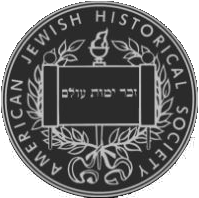On Thursday September 26th the American Jewish Historical Society will be honoring Dr. Jonathan D. Sarna at their annual Emma Lazarus Statue of Liberty Award Gala. Below is a reflection on Dr. Sarna’s early career and the impact he has had on the field of American Jewish history from Zev Eleff, president of Gratz College and professor of American Jewish history.
In May 1975, the American Jewish Historical Society reported on the special projects completed over the past twelve months. One of the items read as follows: “Mr. Jonathan Sarna, a student at Brandeis University, has completed with the help of a grant from the Hebrew Free Loan Society of Boston, the cataloging of a number of manuscript collections.” Back then, the AJHS was located on Brandeis’ Waltham, MA, campus. The undergraduate spent countless hours reading through the Society’s journals and books; whenever possible, mining its archival collections to better understand the stuff of American Jewish history.
He was a young man on a mission.
Today, American Jewish history is one of the largest subfields in Jewish Studies. In the 1970s, however, there were very few scholars who focused on Jewish life in the United States. Mentors tried to counsel Sarna to pursue another discipline. They didn’t think it deserved serious study. “I’ll tell you all that you need to know about American Jewish history,” quipped one incredulous person to Sarna. “The Jews came to America, they abandoned their faith, they began to live like goyim and after a generation or two they intermarried and disappeared.” I imagine that this person recognized that the young Sarna was blessed with a prodigious memory, a keen knack for writing, and a felicity for languages. The older gentleman’s recommendation, therefore: “Don’t waste your time. Go and study Talmud.”
Sarna didn’t listen. Instead, he enrolled at Yale. The experience was transformative. There, he studied under the Pulitzer Prize-winning nineteenth century historian David Brion Davis and the religious historian Sydney Ahlstrom. Their prodigious scholarship and meaningful mentorship convinced Sarna to study American Jewish history as “American Judaism,” i.e., through the lens of religious history. To do this, finding points of comparison and contrast is key. “If you know just one religion,” Sarna likes to say, citing the Harvard religion scholar, Diana Eck, “you don’t know any.”
Just like that earlier, more pessimistic scholar, the Yale faculty recognized Sarna’s promising scholarly disposition.
Davis and Ahlstrom, as well as Jacob Rader Marcus of the Hebrew Union College’s American Jewish Archives, were the principal guides for Sarna’s 1979 dissertation on the journalist and political figure, Mordecai Noah. Sarna’s was a brilliant thesis that focused on the biography of a complicated nineteenth century figure who had spent a lifetime searching how to be a “good American and a good Jew at one and the same time.”
It earned Sarna a faculty position at Hebrew Union College, as Marcus’ junior colleague. Before departing Yale, Davis and Ahlstrom urged Sarna to use his training to write a “big book” on American Judaism. After many formative scholarly projects, and his appointment at Brandeis University as the Joseph H. and Belle R. Braun Chair, Sarna fulfilled that promise to his teachers in 2004. His American Judaism: A History won the National Jewish Book Award and earned Publishers Weekly’s recognition as “Best Religion Book.”
Within American Judaism—Yale released a revised second edition in 2019—are the overarching themes of Jonathan Sarna’s scholarship. These include Sarna’s oft-cited insights into the “Continuities and Discontinuities” of American Jewish life; the “Cult of Synthesis,” a condition that captures the tensions felt by American Jews in their adopted land; and his well-documented assessment about the role of young people in the various “revivals” and “renaissances” of American Jewish culture.
That these themes are overarching owes much to Syndey Ahlstrom’s wisdom that American religious history ought to be understood as a series of cycles. Sarna learned from his teacher that history ebbs and flows; there are highs and lows. It’s a lesson that has resulted in Sarna’s consummate optimism about American Jewish life; a faith that has redounded to his influence as a public scholar and commentator.
The acclaim hasn’t slowed him down. Sarna’s subsequent books and articles cover the gamut—starting from the Colonial period and usually linked to the all-important nineteenth century—from Jewish catechisms to American Haggadah texts, from Jewish women novelists to antisemitic Civil War generals and philosemitic U.S. presidents. All told, his curriculum vitae features more than thirty authored or edited books and over three hundred chapters and articles.
His prolificness is even more startling, owing to the time he has devoted to training some forty doctoral students (me included), the long list of people who contact him with historical questions, engaging in public scholarship, and of course, to his beloved family.
It is altogether fitting that the AJHS has awarded Jonathan Sarna with the 2024 Emma Lazarus Statue of Liberty Award. It was around its bookshelves and amid stacks of Hollinger boxes that a young man commenced his mission to strengthen the field of American Jewish history. He’s certainly accomplished this through his many books, training of students, and his peerless generosity of spirit—and, thankfully, he’s not done yet.


